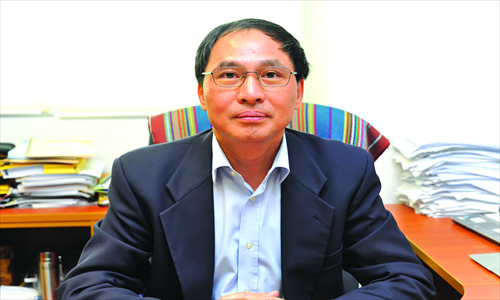Corruption fight requires follow-through

Editor's Note:
For years there have been voices calling for political reforms across China, while progress appears sluggish. Three months have passed since the biggest shuff le in CPC's leadership in a decade, and the new leadership has claimed to be determined to deepen reform. What concrete measures will be carried out to tackle corruption? And what kind of changes will actually take place? Global Times (GT) reporter Wang Wenwen talked to Zheng Yongnian (Zheng), director of the East Asian Institute at the National University of Singapore, on these issues.
GT: Many people believe that currently China is at a time of opportunity for reform and development. What's your perspective on this?
Zheng: The international environment for China's economic growth is not as favorable as in the past.
In the 1980s, many Western countries also carried out reforms, while in the 1990s, we saw a trend of globalization. The international environment paved the way for China's economic development.
But in recent years, as the world economy has been suffering a downturn, depending on exports is no longer a sustainable way for China. That's why China has started to reorient its economy toward domestic demand, and it needs to further this vigorously at the moment.
It is also a period of opportunity for China's social reform.
China's past development was centered on GDP and came at the cost of social balance.
The public detests unfair income distribution, environmental pollution, dysfunctional healthcare system, and the poor management of public housing.
Any reform needs money. The central government has accumulated a large amount of wealth over the past three decades, and it's time to pay back society.
GT: Many in the West have repeatedly predicted that China will become a democratic country sooner or later. This is also a prevalent understanding of how political systems evolve. The CPC has indicated it has no intention to move toward multi-party democracy, and the calls for political reforms are prominent. How can China's political reform develop in the near future?
Zheng: Political reform should be carried out over several stages, and we should differentiate political reform from democratization.
Some developing countries hadn't undergone profound economic and social development before they realized democracy early on. Different political parties have focused on competing with others, ignoring developing economy and society.
Back in 2002 when the 16th National Congress of the CPC was held, the public also had high expectations of the new leadership.
The continuing calls for political reform show that political reform has come at a crucial period and has a long way to go.
As Chinese society develops, an increasing number of problems have been exposed. The public has many negative sentiments. The middle class and intellectuals have a great desire to get involved in politics.
All these aspects push the public to have high expectations of policymakers.
Nevertheless, reform should be a managed process. If it runs out of control, it will become a revolution.
GT: There are tentative signs of anti-corruption efforts within China, as the new leadership puts this issue at the top of its political agenda. How do you evaluate their attitudes? What concrete measures can be taken?
Zheng: There is no doubt that society and the government have reach consensus on the necessity of anti-corruption.
The ruling CPC recognizes that corruption could lead to the end of both the Party and the country. The real problem is how to carry out anti-corruption work more effectively.
Officials often set off campaigns, and anti-corruption efforts online are thriving. Nevertheless, such storms will only come and go with the wind.
Only a functioning rule of law can make it sustainable. Meanwhile, it can add legitimacy to the rule of the Party.
Deng Xiaoping's idea of the "rule of law" has been talked about immensely. The basic principle China has in its socialist legal system, advocated by Deng, is when there is a law, it must be obeyed, its enforcement must be strict, and law breakers must be punished.
The 15th National Congress of the CPC in 1997 made the "rule of law" a basic strategy.
However, many feel that the "rule of law" in China has been in retreat in the past decade. It is very important for the new leadership to show their political will to carry it out.
Traditionally, China was not a country ruled by law. Now it's time that top leaders turn their political will into concrete laws.
Single strongman politics has long gone in China. Although China is ruled by a single Party, there is severe competition within the Party. This leads to some bringing others' wrongdoings to light, as political parties do in the West.
A mechanism of intra-Party competition can also help crack down on corruption.